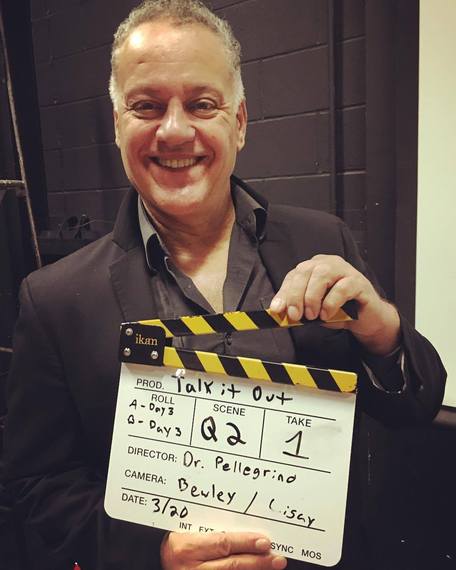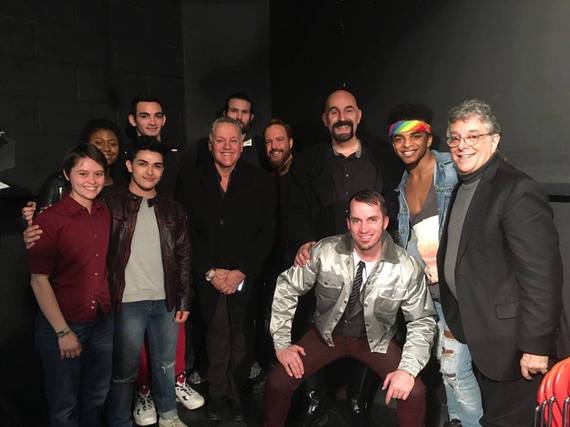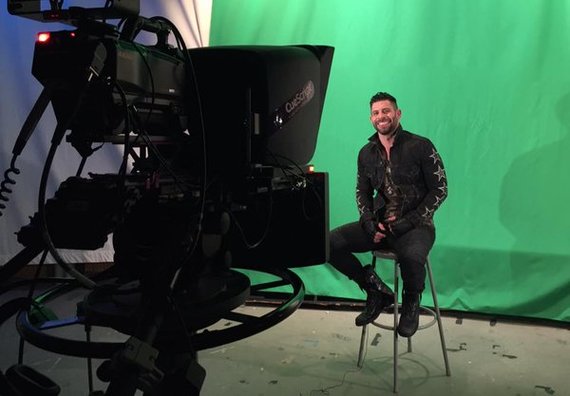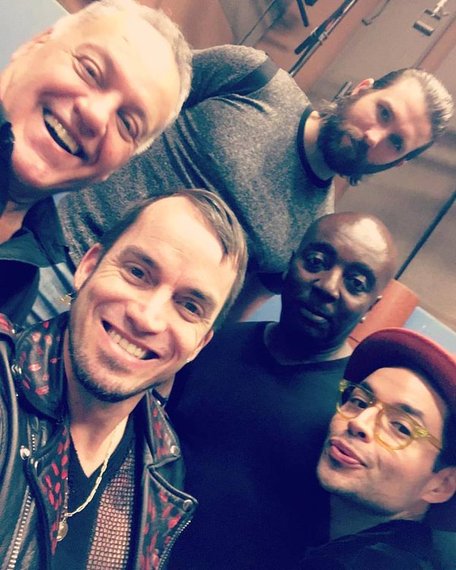Vince Pellegrino, Ph.D., is affectionately known by both his students and friends as "Dr. Vince". At 64 years young, he's clearly at his happiest when working on multiple projects at once. A board certified Drama Therapist, Dr. Vince is an Assistant Professor at Hofstra University on Long Island, about 30 miles east of New York City. With a background in both the performance arts and education, Dr. Vince has dedicated himself to the mental health of the LGBT community. He produces and hosts a weekly talk radio show at Hofstra called Talk it OUT with Dr. Vince, which focuses on issues, events, and concerns of LGBTQ's and their allies.
Dr. Vince came out in 1972, while performing in the then-notorious play The Boys in the Band. He played the character of "Cowboy", the hustler. While it was an affirming experience, a far less positive situation came in 1980. Pellegrino was gay-bashed on the Will Rogers Beach in L.A. while with his boyfriend-- in broad daylight. Ironically, the incident was initially sparked by the two beaus trying to intervene when another man was getting attacked. Pellegrino remembers his attackers "foaming at the mouth" and trying to push him off a cliff. To make matters worse, there was dealing with an LAPD which was not exactly sympathetic to the gay community at the time. Looking back, Pellegrino reflects, "The world is safer, but still not safe for LGBTQ's." He uses the recent Orlando nightclub tragedy, which he was written about, as proof.
Dr. Vince has written columns for Edge Magazine as well as The Huffington Post. In 2014, Pellegrino wrote a full-length book called Talk It OUT: No More Gay Shame. The book featured in-depth interviews and analysis with 20 gay men and one gay woman on the under-explored subject of "gay shame", tying their own personal experiences with the culture of the LGBTQ community at large.
Dr. Vince's newest project is a full-length documentary based on his book, which he's produced and directed. Talk It OUT: No More Gay Shame, the film, features a diverse group of LGBTQ students from his own Hofstra University asking six intimate questions to an equally diverse group of out-and-proud gay men, and hearing their in-depth stories related to those questions. The students were also asked to relate their own personal experience to the question. The issues addressed in the movie include growing up gay, experiences with gay shame and bullying, gay elitism, prideful moments, and desires for both their own futures as well as the future of the LGBTQ community at large. Among the participants in the documentary are singer/songwriters Ari Gold and Eric Alan, journalist/pop culture raconteur Michael Musto, artist/photographer Rob Ordonez, and radio personality J.C. Alvarez. The film is set to premiere, appropriately enough, at Hofstra University on Long Island on September 30.
Dr. Vince took the time to speak to me about the origins of gay shame, his new documentary, and more:
JR: Hello Dr. Vince. Thanks for speaking with me. The name of your upcoming documentary is Talk It OUT: No More Gay Shame. We often hear about "gay pride", but many people haven't heard of "gay shame". When did the concept of "gay shame" first enter your consciousness?
VP: "Gay shame" is the opposite of "gay pride". I studied years ago with this friend named Rob Eichberg. He had a thing called "The Experience". We called it "the gay EST". I took it in California. It was all over the West Coast. I had been to the "The Experience" seminar that weekend, which was the same weekend I had gotten attacked; I believe that was 1980. I shared my gay-bashing story with about 300 guys. I remember crying. "The Experience" was very popular at the time. It did very well for a while. Rob talked about the "victim mentality". That's the lowest level in our consciousness. Above that, there's aggression, and as we go higher and higher, we get healthier and healthier. Then comes responsibility, and abundance, and empowerment. You go through these stages where you're basically taking more responsibility for your actions, and becoming more aware of who you are, and are living your life powerfully. I feel that gay men who deal with shame are not living their life powerfully... not for who they genuinely and authentically are. I felt shame because I grew up with shame. It wasn't just about being gay. It was also about being heavy. There was "fat-shaming". I never felt anything was good enough. We feel shame for who we are, and guilt over what we do. So, "gay shame" is feeling shameful for being gay. Also, we feel guilty for doing what we do, because we are part of a culture where we were taught that what we do as gay men is wrong-- that there is something "bad" or even "evil" about you. Religion also plays a part in that, whether you grow up Catholic, Jewish, or whatever. When I was coming out, I remember a lot of gay men converting to Buddhism, because they felt that it was a more embracing religion.
JR: There has been an explosion of LGBT visibility in the media and in public consciousness. There are are also support groups for LGBT young people, which there had never been when you or I first came out. Some observers may actually think that, as a result, it's easier for someone to come out, or to be openly LGBT in 2016. But as we know, the new generation has new problems of their own, like cyber-bullying-- as evidenced by the interviews with the young people in your documentary.
VP: Yes. Bullies are bullies. Even in 2016, it's open season on your ass if you're gay. If you're a kid whose dad owns guns and supports Trump, and whose mother hates homosexuals, then how can you come out? As for cyber-bullying and cyber-shaming, that's what The Tyler Clementi Foundation is all about. I hosted a symposium with Tyler Clementi's parents, Jane and Joseph Clementi; and the Foundation's executive director, Sean Kofosky. They were also on my radio show. I know Sean personally. That's what The Tyler Clementi Foundation is based on. They used to be more about suicide prevention, but they decided to focus on cyber-bulling and cyber-shaming. Tyler's father believes his son was cyber-shamed, and that's why he jumped off the George Washington bridge.
There's shame in many different ways. When you hear these evangelists say that we're responsible for floods, and that gay men should be "put down" or put into an asylum, or that we should have these "treatments"... That's all shame. The young people hear that and they know they are hated. Do you remember, in my film: When the young man Daniel overheard his father say that when he told him he was gay, he "couldn't have said anything worse"?
JR: Yes, I remember. You are right: All these things add up. You don't even realize it sometimes, but it's a cumulative effect: What we hear, what we see on TV...
VP: It's every movie too. It always ended badly for the gay guy. Like Jake Gyllenhaal in Brokeback Mountain, or in almost every movie in the '60's-- where the gay guy is executed, or commits suicide, or dies another way. Do you remember William Windom? He played a married, closeted gay man in this movie called The Detective, with good old homophobe Frank Sinatra. He kills himself at the end of the movie, after he kills another gay guy-- a very flamboyant gay gay. We always met bad ends in these movies. Or you'll always have something like The Children's Hour, where Shirley MacLaine killed herself over having lesbian thoughts...
JR: Yes. That subject of how LGBT's are depicted in the movies was explored in The Celluloid Closet, the book and the documentary. But thankfully, things are changing!
VP: Only once in a while is there's an exception, like a movie I remember called All Over the Guy, where the two characters end up together. More recently there was the movie Looking, where at least everybody ended matched up. That was nice to see for me. If they weren't matched up, at least they were on the move, or they were successful in their business. All these guys had challenges, and they met and overcame their challenges. That doesn't mean that everything was going to be hunky dory the rest of their lives, but they were happy, and the show ended happy. You should see the movie! I also saw this movie last night called Boulevard which was one of Robin Williams' last movies, with this wonderful actress Kathy Baker. She plays a wife who knew her husband was gay, but they never talked about it. The husband falls in love with a gay hustler, who slowly begins to fall in love with him. The husband ends up leaving his wife. So, he finally came out of living a life in shame. He even tells his father, who's dying in a nursing home. The father was conscious enough to hear what he was saying, and the father actually turns away from him. After all these years of his living a lie and realizing he has to come out, the father turns away from him. This is the "shame"! I'm a scholar of theater. It was safe for gay men to traditionally be the "fop". That dates back to the 1600's. But at least today, an actor like Rupert Everett can play the hunky guy in My Best Friend's Wedding. People like him are groundbreaking in a way, because they can play gay and still be seen as masculine.
JR: What has been the most exciting aspect of this project so far for you?
VP: Seeing my concept come alive: my fears, my experiences, my observations, my empirical data-- all expressed in the participants answering the questions and asking others questions as well. That was very powerful for me. Hearing other people's stories about being bisexual or transgender, which even many in the gay male community doesn't fully understand. That's what's the most exciting. Working with the young people, and with the crew. That's why I feel this film is very important. I look forward to going to schools, and clinics, and youth centers, and film festivals... and having Q&A's afterward.
JR: That's great to hear! So. Is there something that all of us can do, on a day to day basis, to reverse gay shame? What advice would you have-- not just for out and proud LGBTQ's, but also those in the community who aren't ready or able to come out of the closet? What advice would you offer them, as well as to our straight allies-- besides, obviously, seeing the movie?
VP: Be there to listen. We live in a very social world. We're not hermits. We're all interactive with each other. If someone reaches out to you, then just be there for them. I'm speaking mainly about children and young people, but it applies to everyone. If you can't do it right now, then say, "I can't talk to you right now, but can we talk later? Can we set up a time to meet?" Comfort and support are the two things that any one person can give to every human being who needs it. If you're not getting comfort and support from your family or from your relationships, then you need to look at that. That has to be addressed, because the relationship is not complete. It's in the textbook that I use to teach about interpersonal communication. There are other things as well. We all need affection. We need to feel included. And, we need to feel that we have some control, that we are in charge of our own life-- that no one else is telling us what to do or how to feel. But, to reiterate, it's mainly comfort and support. If someone, especially a young person, reaches out to you, offer them comfort and support. It's essential. That's why I hope the movie increases awareness and promotes discussion on the impact of gay shame and how it affects our lives. You have to live your life authentically!
JR: I couldn't agree more. I'll see you at the film premiere!
Talk It OUT: No More Gay Shame, the movie, premieres at The Student Center Theater at Hofstra's Student Union Building, at Hoftsra University in Hempstead, New York on Friday, September 30 at 6PM. The film screening followed by a Q&A session with the cast and crew. The public is welcome to attend this campus-wide event.
Visit Vince Pellegrino, Ph.D.'s website at www.DrVince.tv.
.




